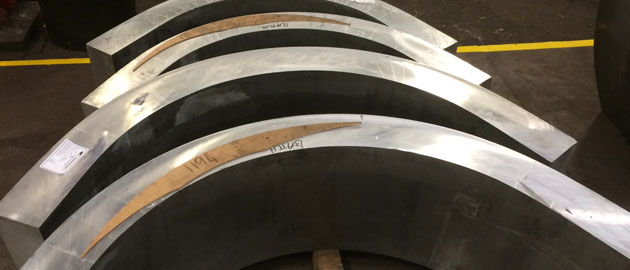
Oktober 8th, 2015
Creating manufacturing jigs for the production of aerospace components requires high quality materials and precision machining. So, when parts of an original jig, which had been press-formed, started to crack, it was essential to find an alternative production method, which led to Barnshaws Metal Bending being contracted to manufacture the new components.
The aerospace industry is understandably extremely demanding when it comes to precision and quality throughout the entire supply chain - in order to ensure the highest levels of safety. The start of the manufacturing process for many components is the production jig, which has taken on a greater prominence with the growing application of resin transfer moulding (RTM) process, which is capable of producing complex three-dimensional components using carbon fibre as the structural element.
Aim Engineering is a specialist manufacturer of bespoke production tooling for a variety of industrial sectors including aerospace and it had been contracted to produce an aluminium jig for creating fan cowl components for a turbofan engine. The base for the moulds is a set of thick, curved aluminium plates that would normally have to be machined from billet to produce the exact shapes required for the carbon composite components, however this results in high waste and cost.
Mark Adams, Production Planner for Aim Engineering, explains: “Initially the alternative was to create the curved aluminium from flat stock using a pressing process, but this was not ideal as we had a plate crack during testing and there were excessive tooling marks on the outer surface. This led us to look for another manufacturing method that would improve the overall quality of the design.”
As a regular client of Barnshaws, Aim Engineering already appreciated the technical abilities of the metal rolling company but was a little uncertain about the feasibility of producing these jig components using rollers. However, once the designers had discussed the requirements it was clear that, given the correct materials, Barnshaws would be able to deliver the required components.
The RTM process enables the cost effective production of precision components from carbon fibre materials as it requires less manufacturing time than more traditional methods using an autoclave. RTM uses a vacuum to draw the resin into the carbon fibres and ensure that all the air bubbles are expelled before the resin cures.
In order for the process to be robust and reliable, the production jig must be strong enough to withstand the repeated application of pressurised resin and the vacuum system. In addition, the mould must be precision machined with an excellent surface finish as this determines the quality of the final components.
In all, Barnshaws produced ten rolled aluminium sections, up to 800 mm in length and varying in thickness from 83 mm to 114 mm. The level of precision required for the curvature of each section was required to hundredths of a degree, with eight different radii specified for the sections ranging from 101.09° to 212.40°.
To achieve such precision and tight curvature, Barnshaws recommended the use of high quality aluminium 5083 that had been annealed to reduce the risk of cracking. This was then passed through precision controlled rollers to gradually bend the flat aluminium stock until the final dimensions were achieved.
Wayne Sakeld, Regional Director at Barnshaws’ Manchester branch, commented: “We are always looking to improve existing technologies - applying our knowledge and expertise to tool-making for the aerospace sector has really paid dividends in this case. The new manufacturing jigs will have greater durability and improved surface finish, which makes them more cost effective to manufacture and use.”
Once the new precision-curved aluminium components were delivered to Aim Engineering they were machined to suit a number of components for the turbofan engine. The superior quality of the thick aluminium segments produced by the rolling process ensured that there was now no scrappage either of the tooling components or of the aircraft production parts.







